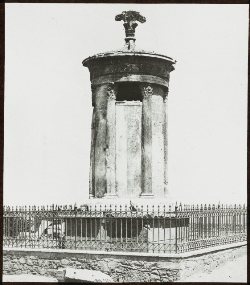

comenius

evolution of the building

changes of drama

poets - greek and roman

masks, costumes and scenery

drama as social event
 |
 comenius |
 evolution of the building |
 changes of drama |
 poets - greek and roman |
 masks, costumes and scenery |
 drama as social event |
The Performance of Greek Drama
Greek
plays were performed as part of religious festivals in honor of the god
Dionysus, and unless later revived, were performed only once. Plays
were funded
by the polis, and always presented in competition with other plays, and
were
voted either the first, second, or third (last) place. Tragedies almost
exclusively dealt with stories from the mythic past (there was no
"contemporary" tragedy), comedies almost exclusively with
contemporary figures and problems.
Tragedies were being presented to honor god
Dionysus. In the major
Tragic
contests were being organized during the Lenea and the Great Dionyssia
(sometimes also during the Anthesteria). During the Rural Dionyssia
some old
plays were represented. New tragedies were presented during the Great
Dionyssia, the biggest celebration after Panathenea. This celebration
was
lasting for six days. The first day was the day when the sacred parade
was
taking place (foreigners were allowed to participate). The next two
days were
the days, when dithyrambic dancing contests were being held. During the
last
three days drama contests were being organized.
Only three
poets were allowed to participate. The Honorable Archon had the right
to make
the choice of the three final participants. If a poet wished to
participate, he
had to submit to the Honorable Archon three tragedies and one satiric
drama, in
other words, a tetralogy. The Archon was choosing the three poets, who
were
paid from the State, as also the hypocrites, three for every poet. The
expenses
for the chorus were covered by Sponsors (choregoi),
wealthy Athenians. They were also paying for the costumes and the
chorus
teacher (if the poet needed one). The Sponsors were deeply respected in
Athenian society. Some times the sponsorship was being considered as an
income
task. Still some wealthy Athenians volunteered for this task.
A few days
before the contest the list of the judges was being formed ( 500
Athenians - 50
from each line ). Their names were written in little spheres and kept
closed in
ten urns in Parthenon.
The presentation was beginning with the sunrise. Every poet participated each of the three last days with his tetralogy. The Athenians who were attending the presentation did not pay any ticket, because this was paid to the producer by the State (Theorica), so that even the poor could participate to the celebration.
 |
| A ticket to Theater of Dionysos |
At the end of the presentation ten judges were being elected, one out of every urn, five of which, chosen by lottery, were deciding for the winner, after taking under consideration and the opinion of the audience (based on their reactions). The herald was announcing the name of the winner and the Honorable Archon was putting on the winner's head a crown of ivy, the holy plant of Dionysus. The State was keeping official records of the contests, on boards made of marble with the names of the poets, the sponsors and the hypocrites.
 |
| The Choragic Monument of
Lysicrates near the Acropolis
of Athens
was erected by the choregos
Lysicrates, a patron of
many theatrical performances in the Theater of Dionysus,
to commemorate the award
of first prize in 335
BC
or 334 BC,
to one of the performances he had sponsored. The choregos
was the sponsor who paid for and supervised the
training of the dramatic
dance-chorus |
Comedies were also being presented to honor god
Dionysus. Since 486 B.C. during the Great Dionyssia, as the sources mention,
after the contest of tragedy the contest of comedy was taking place.
The
contest lasted only one day. Five poets of comedy used to present play, and one of them was the winner.
After the 4th century B.C. the performances of comedy were no more connected with Dionysus. Comedies were presented in honor of other Gods. Dramatical contests were organised during fests. After 315 b.C. comedies, as well as tragedies, were presented during several social events like royal weddings, after victories, e.t.c..
The
audience
Men, women, children, slaves and foreigners could watch the theatrical performances. The state had attended to grand the compensation of ticket in the destitutes. There were some people who cared to put the public to their seats. The spectators passed all their day in the theatre, so they brought the suitable supplies. The rerepresentations began afterwards the official ceremonies. The story was acquaintance and the only things which changes were the music, the interpretation and the philosophy of the story. The spectators show if they liked the show or they disapproved it.
|
|
|
Fragment
of a black figure vase. Audience of a theatrical performance. Ca end of
6 cen.
BC. |
The
political meaning of drama
The drama
reached in top at 5th B.C. century. This period wasn’t
accidental.
There was democracy in